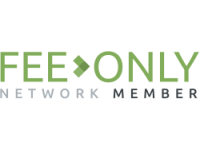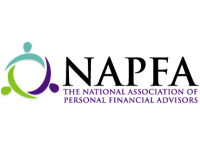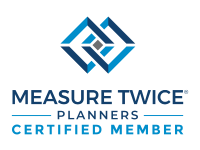What is comprehensive financial planning?
Comprehensive financial planning is a holistic process that involves evaluating your current financial situation, identifying your life & financial goals, and developing a personalized plan to help you achieve those goals.
Most of my plans include income and cash flow planning, real estate and stock investment strategy aimed at aggressively building wealth, retirement planning, estate planning, and using insurance and other risk mitigation strategies to reduce your risk and liability.
Tax planning is not the first thing that we do, but it is the most important thing that we’ll do and touches nearly every other aspect of your financial plan.
Other common areas included in the plan are healthcare and education planning.
The goal of comprehensive financial planning is to provide a holistic approach to managing your finances and help you make informed decisions that align with your unique needs and objectives.
What does it mean that you’re a fiduciary?
As a fiduciary, I am legally and ethically obligated to act in your best interest and put your interests ahead of my own. I have signed Fiduciary Oaths with XYPN and NAPFA. This means that I must minimize and avoid any conflicts of interest and provide you with unbiased and objective advice. I am required to fully disclose any potential conflicts of interest and provide transparent information about fees and compensation. By acting as a fiduciary, I prioritize your needs and goals and work to ensure that my advice and recommendations align with your best interests.
These reasons are why I’ve chosen to be a fee-only firm with transparent flat fees for my services.
To learn more about the fiduciary standard that I’m upheld to, check out this article on Forbes.
To learn about the difference between the fiduciary standard and the suitability standard, check out this article on Investopedia.
Questions for you to consider
Would you prefer to work with an advisor or financial planner who is beholden to the fiduciary standard or the suitability standard?
How would you feel if you learn that your advisor’s advice is held to the fiduciary standard but the products (e.g., insurance they sell you, mutual funds that they invest you in) are only held to a suitability standard, which doesn’t include a fee analysis?
If you’re unsure if your advisor is a fiduciary or not, ask them to sign this Fiduciary Oath. If they won’t, that’s a good indication that while their advice may be the best they know how to give, they’re recommending products that may have bigger conflicts of interest and be more expensive for you.
One Final Consideration
Finally, also be aware that the level of education and training that an advisor/planner has directly affected their ability to be a fiduciary. There is some interesting research out there on why advisors give such outdated advice based on the research that we now have. (Think of all the research surrounding the benefits of passive investing in index funds and ETFs vs. actively managed mutual funds.)
What the research found is that advisors who gave lower quality advice actually invest the same way themselves! So in an essence, they are giving fiduciary advice in that it’s the best advice they know to give. The problem is that they’ve never attained a higher level of education or done continuing education that kept them up with the times, so they can’t actually give the best advice because they don’t know it! This kills me!
Would you go to a doctor who graduated from med school in 1988 and still practices today as he/she did back then? I certainly hope not!
This is why the CFP® Certification is such an important credential to look for.
Other higher-level credentials to look for are the Chartered Financial Analyst (CFA), the Certified Investment Management Analyst (CIMA), and the Chartered Financial Consultant (ChFC, which is basically the same education and requirements as the CFP® Certification minus the CFP® Exam requirement. Many people, including me, have done the ChFC and taken the CFP exam to complete both credentials).
Being a competent fiduciary is a big deal to me. If you have any questions, let me know!
What does it mean to be a "fee-only" firm?
As a fee-only financial planning firm, I’m compensated solely by the fees paid by my clients for the services provided.
My firm does not receive commissions, referral fees, or other compensation from third-party financial products (e.g., insurance products, mutual funds with load fees, etc.), which minimizes potential conflicts of interest.
By operating on a fee-only basis, I aim to provide objective and unbiased advice that is solely in the best interest of my clients.
What does it mean to be a "flat-fee" firm?
A flat-fee financial planning firm charges a fixed, upfront fee for its financial planning services, rather than a fee based on a percentage of the assets managed (i.e., AUM) or commissions on financial products sold.
This fee is determined based on the complexity of my client’s financial situation and the scope of services provided. Flat-fee financial planning firms aim to provide transparent and predictable pricing for their services, which can help clients better plan and budget for their financial needs. By charging a flat fee, these firms can also avoid potential conflicts of interest that may arise from commission-based compensation models.
Do you work with clients virtually?
Yes! While Cornerstone Financial Planning is a local fee-only financial planning firm in Colorado Springs, CO, I offer financial planning and investment advice for clients across the United States in a virtual format. But if you are local and would like to meet up, I’d love to meet at my closest “virtual office” / coffee shop! 😉
However, I’ve found that I can offer the greatest amount of flexibility for scheduling meetings for my clients and myself by mostly sticking to a virtual schedule so I can best accommodate your work schedule and other priorities.
Who is your ideal client?
My passion lies in educating and helping people attain financial freedom through real estate, entrepreneurship, and factor investing so that they can create their ideal life NOW.
My ideal clients are people who are real estate investors or professionals (RE agents, lenders, brokers, contractors, PMs, etc.) AND anyone wanting to be an investor but needing the confidence of working 1:1 with a real estate investing coach who also happens to be an investor and financial planner to give you the confidence to get started building wealth.
If you’re unsure if I’m the right fit for you, schedule a free, no-obligation intro call and ask. I’ll be glad to answer your questions and share more about my process and services with you and if you or I recognize that we’re not the right fit then I’ll gladly refer you to 1-2 other financial planners who may be a better fit for you that I know and trust that are also fee-only and work with real estate investors.
What makes you or your firm particularly qualified to serve real estate investors?
About 5 years ago, we were living in Germany. My car battery died and when I replaced it the radio in my 2006 Honda Civic wouldn’t work. So I began listening to podcasts. BiggerPockets was something that I had been getting into. I had read Rich Dad, Poor Dad almost 19 years ago and while I gleaned some awesome nuggets from it, everything that Robert Kiyosaki talked about regarding real estate just seemed too shady for me. I had also been listening to Dave Ramsey on and off since I was 18. And his take on debt combined with Kiyosaki’s risk kind of had me at a standstill.
But that all changed when I began listening to BiggerPockets. I so appreciate them and their platform. For the first time, I heard people discussing the real risks of real estate investing. I also learned what I considered to be realistic strategies to invest in real estate. So I dove in and binge-listened to probably hundreds of their podcasts and read a good chunk of their books. Basically, they converted me from a real estate skeptic to a believer. I’m honestly glad that I had to go through that process from skeptic to optimist. Too many people, especially over the past 2-3 years with the boom in housing prices, have only been optimistic and some I know have gotten burned. So I always want to keep a healthy amount of skepticism when evaluating every property that I look at. If it passes my first analysis, then it’s definitely worth looking into further.
Fast-forward to today, I own 12 doors in 2 properties. My passion is multifamily and I own an 11-unit building in Ohio I’m in the process of adding 2 more 1BR/1BA units in the basement so it’ll become a 13-unit building. But I also got interested in the Austin, TX housing market and decided that it would be worth diversifying there. So I bought a SFH from a wholesaler and am nearly done renovating it.
I love both approaches and how they each have unique risks and opportunities, strengths and weaknesses. I will continue building my portfolio in both areas with potential expansion elsewhere. However, I have excellent teams in both locations and that’s HUGE, so I want to continue working with my contractors and PMs since we’ve established so much trust.
I find it highly ironic that for all those years while living in Germany and transitioning from skeptic to believer that I was too afraid of being a long-distance landlord. Ironically, we moved back to the states to Colorado and as I was looking at houses there, I just couldn’t justify paying between $150-$225 per door when I could spend less than a third of that in Ohio and get 75% of the rent.
My areas of expertise are in deal analysis (I love running the numbers and have found that I’m way more conservative and thorough than most other investors I come across in the Facebook groups), house hacking, the BRRRR, and how to build a team as a long-distance landlord. I’ve found that a lot of investors are winging it and lack the intentionality that it takes to succeed, especially when being a long-distance landlord.
Finally, in addition to being a real estate investor, I’m also a Candidate for CFP® Certification, which gets into the weeds of income and taxation. I’ve taken classes and exams that covered 1031 exchanges, Section 179/1245/1250 depreciation and depreciation recapture, and how to *proactively plan* and analyze when taking advantage of something like a cost-segregation study may make sense. I also project future taxes and depreciation recapture for investors so that the decision to sell becomes more clear as to whether they should sell it and move on (depreciation recapture + capital gains taxes come due) or 1031 into a different property, or consider 1031 into a Delaware Statutory Trust (DST), which are extremely unique opportunities to take advantage of continued depreciation deferral and a step-up in basis at death for your heirs, all while being completely passive.
I’m also going through the very first iteration of the Real Estate Financial Coach (REFC) Certification program, which was designed specifically for financial planners who work with real estate advisors. We’re going so deep into so many areas. I’m learning such good stuff that just doesn’t exist in the forums or books that I’ve found yet. For example, should real estate be held in an S Corps? The answer is most likely, “no!” – but do you know why? Because the people on Facebook don’t know that you lose almost every taxation benefit, there’s no step-up in basis at death, depreciation recapture may be triggered, and so on. So I’ve loved learning these deeper nuances that have such a HUGE potential to make a big difference in real estate investors’ lives who just want to do the best they can and set their families up for success.
When I read comments on Facebook, it’s clear that there are a lot of people out there who have googled something or read a book by someone else who googled something and are acting on it. Sometimes it makes sense, often it doesn’t.
If you have any questions, don’t hesitate to schedule a free Intro Call to ask more! I love to talk about this stuff and there’s no obligation to work with me after the call.
What are the biggest misconceptions about financial planning?
I would say that the biggest misconception about financial planners is that we mostly sell insurance and want to take over all of your investments.
Most people don’t realize that financial planners, especially those held to the CFP Board of Standards as I am, are beholden to the requirements for CERTIFIED FINANCIAL PLANNER™ certification. This means that every financial planner, even those like me who have completed the coursework and passed the exam but haven’t yet met the experience requirement, are required to uphold the standards of competency and ethics for financial planners who are committed to CFP Board of Standards to putting their client’s best interests first, known as the fiduciary standard.








